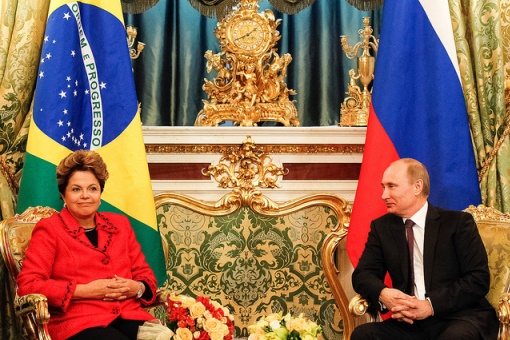Dynamics within the Ukraine are forcing reconsideration of an old concept in international politics–the sphere of influence. Russian President Vladimir Putin has not hesitated in saying that Russia has interests in the Ukraine, reserving the right to use force. Some Latin American governments have spoken out against the dismissal of former Ukrainian President Viktor Yanukovych and applauded Russia’s decision to intervene in the Ukrainian conflict. What they seem to ignore is that they are endorsing a move that directly contradicts their interest in increasing political autonomy.
The international political system tends towards multipolarity, where there are multiple power influences, and therefore towards greater political autonomy. However, diminishing spheres of influence are no longer clearly distinguishable as a reality or even as a current useful concept. There are shifts of economic and military power from the Atlantic to the Pacific, and the gaps between the northern powers and the emerging south are being filled. Multipolarity allows the rise of new patterns of South-South cooperation, favoring conditions for regional and smaller powers to act more freely. The key to multipolarity is the decentralization of a lesser hierarchical structure, and the new Latin American regionalism is an outcome of autonomy. In the Western Hemisphere that is interpreted as post-hegemony.
In the case of the Ukrainian crisis, Barack Obama’s proposition to punish Russia by isolation is simply not realistic. There are diverging views on the effectiveness of sanctions, but it is commonly accepted that multilateral actions are better than unilateral. It is also important to consider the target’s strength. Russia’s economic and energy ties with the EU and China, as well as its links with emerging and secondary regional powers make it almost untouchable, at least in avoiding a global shock. Politically, Russia is a centerpiece in the UN collective security system and at the same time serves as the world’s second-largest weapon dealer. Each of Russia’s strategic moves is made anticipating the potential choices of their rivals.
At the same time, the EU has exposed its inconsistency as an international player. The best European strategy has been passing the buck of direct confrontations to the US, while Obama paints red lines in vain, as he did in Syria. European and American impotence is not due to a loss of capabilities, but because of high risk aversion, which is typical in liberal democracies. Russia has the leverage to raise the political cost of each action against its interests. The hegemonic party system managed by Putin, which centralizes the decision-making process, brings better chances for an effective international performance. On one hand, chances of success are greater if the leader is also ambitious, cold minded, and determined. On the other hand, decision-making centralization could have catastrophic outcomes due to the risk propensity and lack of institutional controls.
Putin’s Russia has drawn the attention of leaders across Latin America. For example, Caracas established a close relationship with Moscow, becoming the Russian military industry’s first hemispheric customer, which allowed Russia easy access to Venezuela’s oil and civil engineering. In another case of Russian influence, Nicaragua and Venezuela recognized the independence of Abkhazia and South Ossetia following the Georgian War only after Russia did so first. Brazil has maintained relations with Russia within the BRICS diplomatic coordination through a partial commitment approach. The governments of Argentina, Ecuador and Bolivia are also sympathetic towards Moscow, and Cuba has a special relationship with Russia consolidated by their historical political ties. As a region, Latin American looks to Russia, as well as to China, Turkey, and Iran, in order to undermine the persistent influence of the United States. Those balancing policies respond to the autonomy provided by multipolarity and post-hegemony.
But there is a conflict in balancing the former hegemonic power and solidarity that attempts to revive spheres of influence. The main Bolivarian Alliance (ALBA) members—Venezuela, Bolivia, Nicaragua, and Cuba—supported the Russian position on the Crimean referendum, while the members of MERCOSUR abstained. On the other end of the spectrum, the Pacific Alliance countries voted against Russia. Latin America has invested close to three decades to breaking the East-West logic (which favors the building of hegemonic spheres of influence), generating South-South cooperation, and creating a more symmetric North-South relationship. Overlooking Russia’s legitimate interests and rights in its periphery is equivalent to ignoring one’s own international demands. The would-be precedent settled with the Russian intervention over the Ukraine—a region considered in its sphere of influence— mobilizes geopolitical mechanisms of informal recognition over other spheres of influence, including the Western Hemisphere.
Latin American countries have neither the power nor the cohesion to effectively function without outside assistance, and Latin American autonomy is largely due to American over-focus on Eurasia. A change was possible after the Soviet collapse and the fade of the spheres of influence. However, their restoration could involve a progressive trench of the great powers in their own regions, even a potential reconstruction of the hemispheric hegemony.
A short-term re-establishment of spheres of influence is unthinkable; many may have formidable resistance (e.g. China in East Asia). And we should not take for granted that Washington will withdraw soon from other important regions, or will allow a setback in Crimea as a final defeat of its Eurasian geostrategy. The impulsive solidarity with Russian actions in post-soviet regions shows ALBA and MERCOSUR ruling elite’s inability to identify their own interests in a multipolar world.








